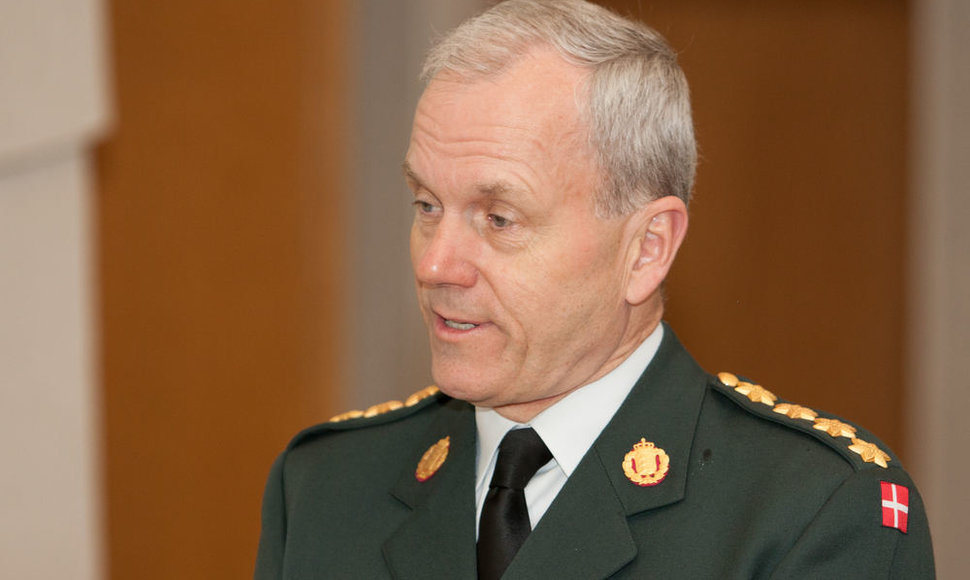The high-ranking NATO officer underlines, however, that NATO member countries, including Lithuania, should try to get along with their neighbors.
"There should be no doubt that the foundation of NATO is security of the Allies and that's the so-called Article 5 which is one of the key missions of the Alliance. I am aware of what is taking place in Kaliningrad and I have also taken due note, among other things, of what has been put forward by General (Nikolai) Makarov during his visits in the region recently. (…) I intend to go to visit Russia during this autumn and I will definitely raise it with the Russian military authorities," Bartels said in an interview to BNS, asked whether he considered the processes in Kaliningrad to be concentration of military capabilities.
"On the other hand, I strongly believe that we must continue our dialogue with Russia to understand each other better and not to be afraid to touch upon the difficult issues. I want to make absolutely clear that military conflicts and military confrontation are to nobody's advantage in any way and we need to look at solutions which involve both," the Danish general said.
According to him, the issue of the so-called contingency plans was raised at a meeting with Lithuania's military leadership on Thursday.
"Now the plans themselves are primarily the responsibility of the Supreme Allied Commander Europe. I'm not as such personally actively involved, apart from the fact that the Military Committee for which I am responsible monitors them. Contingency plans are what they are - to be able to handle contingencies. And that's why we conduct the exercises accordingly," the former chief of defense of Denmark said.
"But contingency plans have to exist in parallel with the dialogue with the neighbors and the ability to create the best possible relations with all neighbors and that also involves of course this part of the Alliance, the Baltic states. And therefore, as I mentioned earlier, I am convinced of the importance of dialogue with Lithuania's neighbors," Bartels said.
The general added that Lithuania was also a contributor to common security and was not only a consumer.
"I highlighted the Lithuanian participation in ISAF and I know that and also know that there are thoughts about the future in Afghanistan from 2015 and other ongoing operations with NATO. I can only express my great support for that. I was informed and I am very happy to hear that the parliament has passed a law authorizing participation in operation "Ocean Shield" which I think is an important step," he said.
"When you talk about defense budgets, Lithuania has been through a difficult crisis. I know that there has been an agreement by the political parties to increase the defense budget from the roughly speaking 0.8 percent approaching the 2 percent, and I hope very much that this will take place so that Lithuanian armed forces will be able to contribute to common security even more," Bartels said.
Bartels took the helm of the NATO Military Committee in January 2012, replacing Italian Admiral Giampaolo Di Paola.
Not only Lithuania's concerns
Lithuania welcomes Chairman of the NATO Military Committee General Knud Bartels' plans to raise the issue of Kaliningrad's militarization with the Russian military authorities, Lithuanian Minister of National Defense Rasa Juknevičienė said following a Friday meeting with the general.
"What he said about the future conversations with Russia's highest military leader General (Nikolai) Makarov is what we really want. [...] These are not only our concerns," the minister said after the meeting with Bartels and Lithuanian Prime Minister Andrius Kubilius.
Russia has warned it would deploy the most modern surface-to-surface and surface-too-air missiles, like S-400 and Iskander, if NATO failed to take into account Russia's position regarding the missile defense system.
The Lithuanian prime minister said at the press conference that the plan was "to have a wider look at our issues in the region, the geopolitical security issues" during the meeting with the chairman of the NATO Military Committee.
"We had a good opportunity to explain how our NATO membership is important for us, allowing us to feel absolutely differently from the way we could or would feel through the long centuries of history," Kubilius said.
"Being a member of the NATO community, Lithuania is safe, and together with partners we can assume responsibility to solve security problems in other parts of the world as well," the Lithuanian prime minister said.












